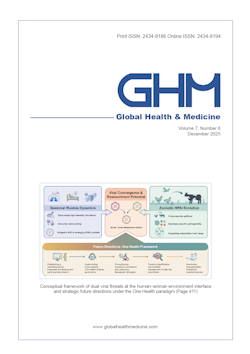Global Health & Medicine 2022;4(2):83-93.
Long COVID: current status in Japan and knowledge about its molecular background
Matsunaga A, Tsuzuki S, Morioka S, Ohmagari N, Ishizaka Y
Even after recovering from coronavirus disease 2019 (COVID-19), patients can experience prolonged complaints, referred to as "long COVID". Similar to reports in Caucasians, a follow-up study in Japan revealed that fatigue, dyspnea, cough, anosmia/dysgeusia, and dyssomnia are common symptoms. Although the precise mode of long COVID remains elusive, multiple etiologies such as direct organ damage by infection with severe acute respiratory syndrome coronavirus-2 (SARS-CoV-2), autoimmunity, prolonged inflammatory reactions, and psychiatric impairment seem to be involved. Notably, SARS-CoV-2 is neurotropic, and viral RNA and proteins are continuously detectable in multiple organs, including the brain. Viral proteins exert a number of different toxic effects on cells, suggesting that persistent infection is a key element for understanding long COVID. Here, we first reviewed the current status of long COVID in Japan, and then summarized literature that help us understand the molecular background of the symptoms. Finally, we discuss the feasibility of vaccination as a treatment for patients with long COVID.
DOI: 10.35772/ghm.2022.01013







